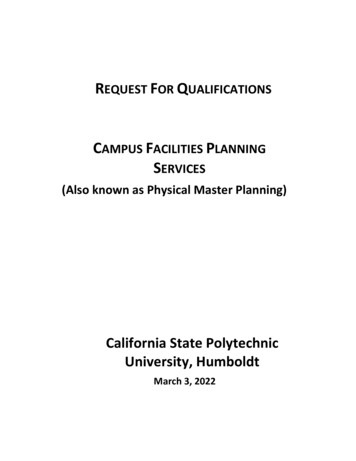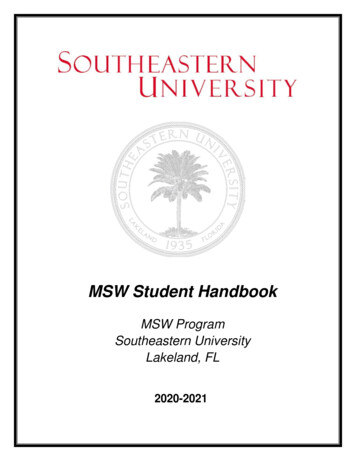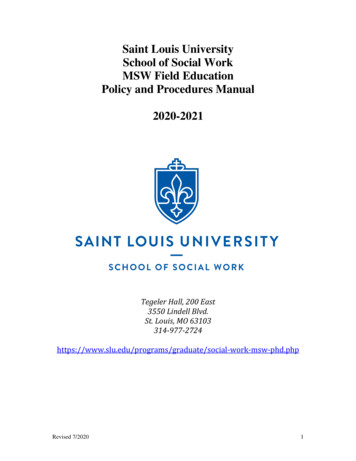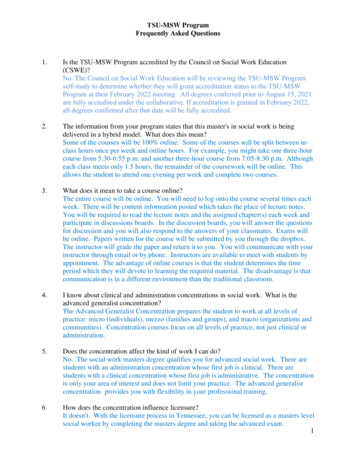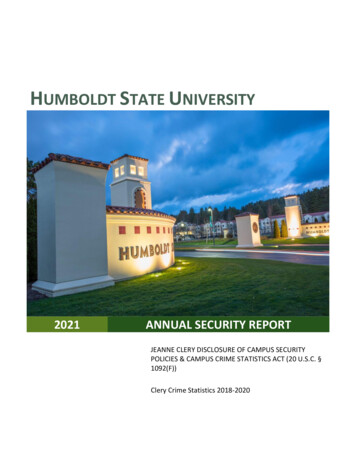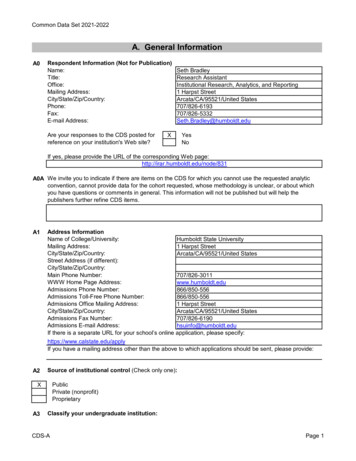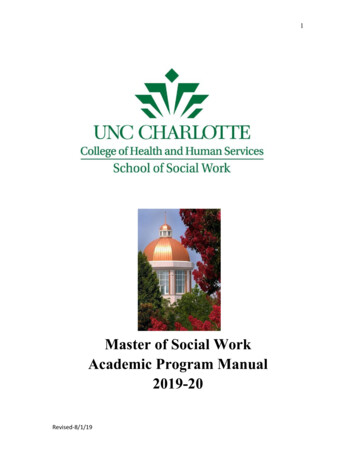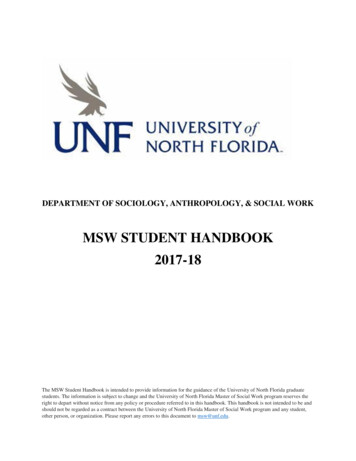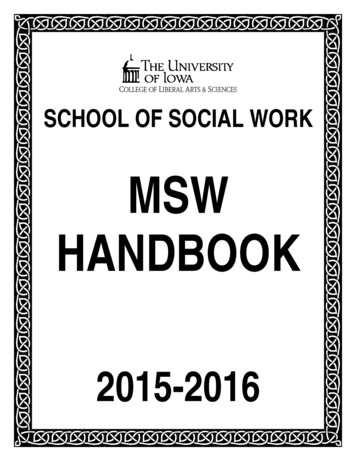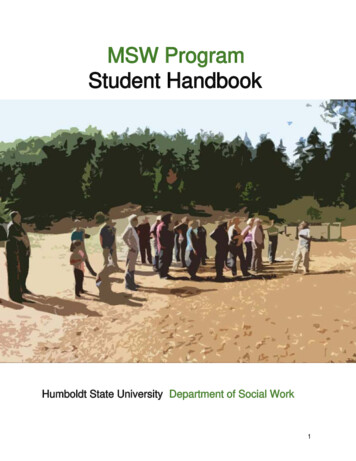
Transcription
MSW ProgramStudent HandbookHumboldt State University Department of Social Work1
Table of ContentsTable of Contents2Letter of Welcome4The Humboldt State University MSW Program4Purpose, Vision, Values & Culture6MSW Program Goals7MSW Program Competencies & BehaviorsFoundation Year MSW Program Competencies and BehaviorsAdvanced Year MSW Program Competencies and Behaviors7711MSW Degree RequirementsPolicies Related to MSW Degree RequirementsWaiver of Duplicative Course WorkPolicy for Waiver of Duplicate Course WorkProcedures to Request Waiver of Duplicative Course WorkTransferable Credit for Graduate Course WorkCSWE-Accredited or International MSW Program Course WorkGeneral Graduate Level CourseworkProcedures on Transfer Credit161616171718181819MSW Course of StudyCampus MSW Programs2 Year Foundation MSW Program- Campus1 Year Advanced Standing MSW Program- CampusDistributed Learning (DL) MSW Programs3.5 Year Part Time DL MSW Program2 Year Part Time Advanced Standing DL MSW Program20202021222223Course DescriptionsIndependent Studies SW 599 and SW 699Independent Study Contract252829The Field Component30California IV -E Child Welfare Training Project32Advising33EnrollmentEntering Students34342
Continuing atementWithdrawal and ReadmissionLeave of AbsenceAttendance PolicyGrades and Grade AppealsIncomplete Grades34353535353636363838Student Rights and Responsibilities on the University Campus39Student Rights in Relation to Harassment39Title IX Notice of Non-Discrimination41Mandated Reporting, Sexualized Violence Disclosures & CSU Interpretation of Title IX42Social Work Department Nondiscrimination Policy Statement42Student Academic/Professional Support and Review Process43Support Process43Review Process44Processfor Resolution of Student Concerns44Overview of Student Grievance Procedure Related to Grade or Policy Dispute44The Social Work Student Association (SWSA)46AppendicesAppendix 1: Campus ResourcesAppendix 2: National Association of Social Workers Code of EthicsAppendix 3: CSWE Educational Policy and Accreditation StandardsAppendix 4: Grievance Policy and Procedures for Students Filing Complaints other thanDiscrimination or Unprofessional Conduct against Faculty, Staff or AdministratorsAppendix 5: HSU Nondiscrimination PolicyAppendix 6: HSU Policy against Sexual Harassment and Sexual AssaultAppendix 7: Academic Honesty PolicyAppendix 8: Student Records Access PolicyAppendix 9: HSU Policy for Protection of Human Subjects Research474749494949495050503
Letter of WelcomeWe are excited that you have joined us and look forward to your participation and contributionsas partners in a meaningful educational experience. The MSW program is committed to fosteryour talents and dedication for compassionate, self-reflective, and ethical practice. The MSWprogram prepares you for advanced generalist social work practice with a specific focus on socialwork practice within rural and Native American communities. In addition, our MSW program isfully accredited by the Council on SocialWork Education (CSWE).This handbook provides information about the Master of Social Work program at HumboldtState University. You will find information related to the mission, objectives, policies, and otherrelated information. You are responsible toread through that handbook and familiarize yourselfwith the program, your rights and responsibilities. These policies are designed to ensure a solidand well developed program and your successful navigation through it.The MSW Program administrative and faculty offices are located on the 4th and 5th floors of theBehavioral and Social Sciences (BSS) Building on the HSU campus. For more information, contactTina Georganas at tina.georganas@humboldt.edu or (707) 826-4443.Information can be found from many sources. The bulletin boards next to the MSW and BSWadministrative office are used for posting information about financial aid, courses, speciallectures and workshops, student meetings, program announcements and other pertinent news.We also use e-mail exclusively to communicate updates and other important information. PerAcademic Senate Policy, you are required to ensure that the university has your accurate emailaddress and that you check your email. Please make sure that you update your Humboldtemailpreferences if you use an outside account. We have an MSW listserv which we use as anothertool for communication and you will be enrolled in this listserv. The MSW program’s s/masters -degree-social-work ) is alsocontinually updated and this is where forms and other paperwork related to the program can befound. The Graduate studies website ents) and the online General HSU Handbook for Master’s Students provide additionalinformation as well. When necessary, the Graduate Studies office isocatedlin Siemens Hall 217,or they can be reached at (707) 826-3949.We look forward to working with you to create an MSW program that provides and exciting andacademically rigorous learning environment that supports honest self-reflection on our ownpractice and a collective approach to enhancing our capacity to be of service to individuals,families, groups, communities and organizations. We hope we can join together to create alearning community that reflect our commitment to social and economic justice and provides aplace where each of us can demonstrate our full potential.Sincerely,Geneva ShawMSW Program DirectorThe Humboldt State University MSW Program4
The MSW curriculum provides courses that help students gain a theoretical understanding of thedynamic relationship of people and their environments and the meaning and possibilities forchange within a historical and cultural context. Students develop a framework for practice guidedby personal and professional values and ethics. Culturally humility, compassion, partnership,empowerment, non-expert relational paradigms, critical reflection and social action for justiceare the concepts that form the foundation for learning and developing social work practice atHumboldt State University. The program prepares students for advanced generalist practicewhich emphasizes multi-system, multi-level approaches in which practitioners and clients work incollaboration to enhance the functioning and resilience within systems through building onexisting strengths.The curriculum exposes students to the diversity of cultures and the biological, psychological,familial, social, historical, economic, spiritual and political factors that influence distinct andcommon paths of development among individuals, groups and societies with particular attentionto diversity within rural and Native American communities.The MSW Program values the different ways students learn through their experiences andrelationships with faculty, peers, clients, supervisors and others to gain knowledge and findmeaning in their professional development. These experiences serve to facilitate students'understanding of ways to connect with clients that enable mutual learning.The MSW experience at Humboldt State University is formative, as well as educative. Thestudent enters with capacities, strengths, experiences and a way of being, and is joined by thefaculty in a process of fostering continuing development as a social worker. We recognize thatthe intellectual/cognitive challenges are only a part of the process of social work education. Thisenterprise involves the whole person and has psychological, emotional, social and spiritualmeaning. Students are encouraged to pursue opportunities to enhance and utilize their wholeperson in their development as a social worker. This may include opportunities for psychological,emotional, social and spiritual growth5
Purpose, Vision, Values & CulturePurposeThe purpose of the Department of Social Work at Humboldt State University iso:t Provide high quality educational programs that promote excellence in the social workprofession. Engage with tribal, academic, and professional communities to improve the wellbeing ofindividuals, families, groups, organizations, and communities, and enhance the physical andnatural environments within which people live, with particular emphasis on ruralNorthwestern California. Offer students and community members opportunities to develop skills, leadership capacity,knowledge, practices, and methodologies for fostering change; bringing about social justice,environmental justice, and economic justice; and addressing and healing the ongoing effectsof colonization.VisionThe Department faculty, staff and students are viewed and utilized as highly skilled, innovative,creative, competent, and collaborative social work partners. Our reputation, activities, andpartnerships attract students and other constituents from local, state, tribal, national, andinternational contexts. The Department actively contributes to making social work a liberatoryprofession and the world a more just place.Values AccessibilityExcellenceAcademic RigorCriticalityProfessional DevelopmentCompassionCultureWe strive to create a department culture for students, staff, and faculty that is characterized by: Transparency - In decision making, distribution of resources, staffing, special projects,administration, etc. Mindfulness - Thoughtful, centered speech and action. Inclusiveness - Embracing differences in background, experience, expertise, ideas, andperspectives. Supportive Workplace Climate - Mutual respectfulness, support, appreciation, andacknowledgment of each person’s contributions, including humor and playfulness. Culture of Inquiry - Suspension of judgment, listening to learn. Congruence - Clear, direct, respectful communication; consistency between talk and action,including caring, respectful, mutually supportive behavior. Sustainability - Prioritizing long-term sustainability over short-term benefit; collective goodover personal agendas.6
MSW Program GoalsThe goals of the MSW Program are to:1.) Prepare students for professional social work practice responsive to the challenges andresources present in rural areas in general and indigenous communities in particular.2.) Present local historical and contemporary social issues within a global perspective.MSW Program Competencies & BehaviorsFoundation Year MSW Program Competencies and BehaviorsCompetency 1: Demonstrate ethical and professional behavior, particularly with respect towork with Indigenous and rural communities.Social workers understand the value base of the profession and its ethical standards, as well as relevantand regulations that may impact practice at the micro, mezzo, and macro levels. Social workers undersframeworks of ethical decision-making and how to apply principles of critical thinking to those frameworks inpractice, research, and policy arenas. Social workers recognize personal values and the distinction betpersonal and professional values. They also understand how their personal experiences andreactionsaffectiveinfluence their professional judgment and behavior. Social workers understand the profession’s history,mission, and the roles and responsibilities of the profession. Social Workers also understand the role oprofessions when engagedin inter-professional teams. Social workers recognize the importance of lifelonglearning and are committed to continually updating their skills to ensure they are relevant and effective.workers also understand emerging forms of technology andethicalthe use of technology in social workpractice.1.11.21.31.41.5Make ethical decisions by applying the standards of the NASW Code of Ethics, IFSW/IASSWethical principles, and/or other social work ethical codes, relevant laws and regulations,models for ethical decision-making, and ethical conduct of researchUse critical reflection and mindfulness to manage personal values and maintainprofessionalism in practice situationsDemonstrate professional roles, relationships, responsibilities, and boundaries in behaviorand appearance, including oral, written, and electronic communicationUse technology ethically and appropriately to facilitate practice outcomesUse supervision and consultation to guide professional judgment and behavior7
Competency 2: Engage diversity and difference in practice, particularly with respect towork with Indigenous and rural communities.Social workers understand how diversity and difference characterize and shape the human experiencecritical to the formation of identity. The dimensions of diversity are understood as the intersectionality omultiple factors including but not limited to age, class, color, culture, disability and ability, ethnicity, gendegender identity and expression, immigration status, marital status, political ideology, race, religion/spiritsex, sexual orientation, and tribal sovereign status. Socialworkers understand that, as a consequence ofdifference, a person’s life experiences may include oppression, poverty, marginalization, and alienationas privilege, power, and acclaim. Social workers also understand the forms and mechanismsssionof oppreanddiscrimination and recognize the extent to which a culture’s structures and values, including social, ecopolitical, and cultural exclusions, may oppress, marginalize, alienate, or create privilege and power.2.1Apply and communicate understanding of the importance of diversity, intersectionality, anddifference in shaping life experiences in practice across ecosystemic contexts2.2Present as learners who engage people as experts of their own experiences and practicecultural humility2.3Apply awareness of power, privilege, and marginalization to reduce the influence of personalbiases and values in working with peopleCompetency 3: Advance human rights and social, economic, and environmental justice,particularly with respect to work with Indigenous and rural communities.Social workers understand that every person regardless of position in society has fundamental humansuchas freedom, safety, privacy, an adequate standard of living, health care, and education. Social wounderstand the global interconnections of oppression and human rights violations, and are knowledgeaabout theories of human need and social justiceand strategies to promote social and economic justice andhuman rights. Social workers understand strategies designed to eliminate oppressive structural barrierensure that social goods, rights, and responsibilities are distributed equitably andcivil,thatpolitical,environmental, economic, social, and cultural human rights are protected.3.1Apply understanding of social, economic, and environmental justice to advocate for humanrights, including Indigenous Peoples Rights, at individual and system levels3.2Engage in practices that advance Indigenous sovereignty; social, economic, andenvironmental justiceCompetency 4: Engage in practice-informed research and research-informed practice,particularly with respect to work with Indigenous and rural communi ties.Social workers understand quantitative and qualitative research methods and their respective roles inadvancing a science of social work and in evaluating their practice. Social workers know the principlesscientific inquiry, and culturallyinformed and ethical approaches to building knowledge. Social workersunderstand that evidence that informs practice derives from multi-disciplinary sources and multiple ways ofknowing. They also understand the processes for translating research findingsinto effective practice.4.1Use practice experience and theory to inform scientific inquiry and research including8
4.24.3Indigenous research methodsApply critical thinking to engage in analysis of quantitative and qualitative research methodsand research findingsUse and translate research evidence to inform and improve practice, policy, programs, andservicesCompetency 5: Engage in policy practice, particularly with respect to work with Indigenousand rural communities.Social workers understand that human rights and social justice, as well as social welfare and services,mediated by policy and its implementation athet federal, state, and local levels. Social workers understanthe history and current structures of social policies and services, the role of policy in service delivery, arole of practice in policy development. Social workers understand theirin rolepolicy development andimplementation within their practice settings at the micro, mezzo, and macro levels and they actively enin policy practice to effect change within those settings. Social workers recognize and understand the, cultural, economic, organizational, environmental, and global influences that affect socihistorical, socialpolicy. They are also knowledgeable about policy formulation, analysis, implementation, and evaluation5.1Identify social policy at the local, state, Tribal, and federal level that impacts well-being,service delivery, and access to social services5.2Assess how social, environmental, and economic policies affect wellbeing, service delivery,and access to social services5.3Apply critical thinking to analyze, formulate, and advocate for policies that advance humanrights, Indigenous sovereignty, and social, economic, and environmental justiceCompetency 6: Engage with individuals, families, groups, organizations, and communities,particularly with respect to work with Indigenous and rural communities.Social workers understand that engagement is an ongoing component of the dynamic and interactive pof social work practice with, and on behalf of, diverse individuals, families, groups, organizations, andcommunities. Social workers value the importance of human relationships. Social workers understandof human behavior and the social environment, and critically evaluate and apply this knowledge to facilitateengagement with clients and constituencies, including individuals, families, groups, organizations, andcommunities. Social workers understand strategies to engage diverse clients andtuenciesconsti to advancepractice effectiveness. Social workers understand how their personal experiences and affective reactioimpact their ability to effectively engage with diverse clients and constituencies. Social workers valueprinciples of relationship-building and inter-professional collaboration to facilitate engagement with clients,constituencies, and other professionals as appropriate.6.1Apply knowledge of human behavior and social environments, decolonization, relationalworldviews, multi -logical perspectives, and other relevant theoretical frameworks to engagewith people and place6.2Use empathy, critical reflection, and interpersonal skills to engage with people and place9
Competency 7: Assess individuals, families, groups, organizations, and communities,particularly with respect to work with Indigenous and rural communities.Social workers understand that assessment is an ongoing component of the dynamic and interactive prof social work practice with, and on behalf of, diverse individuals, families, groups, organizations, andcommunities. Social workers understand theoriesof human behavior and the social environment, andcritically evaluate and apply this knowledge in the assessment of diverse clients and constituencies, incindividuals, families, groups, organizations, and communities. Social workers understanddsmethoofassessment with diverse clients and constituencies to advance practice effectiveness. Social workersrecognize the implications of the larger practice context in the assessment process and value the impoof interprofessional collaboration in isthprocess. Social workers understand how their personal experiencand affective reactions may affect their assessment and decision-making.7.17.27.37.4Collaborate with constituencies to collect, organize, interpret, and critically reflect oninformationApply knowledge of human behavior and social environments, decolonization, relationalworldviews, multi -logical perspectives, and other relevant theoretical frameworks in theanalysis of assessment dataDevelop mutually agreed upon intervention goals and objectives based on the assessment ofstrengths, needs, challenges, and barriersSelect intervention strategies based on the assessment, research knowledge, and values andpreferences of people and communitiesCompetency 8: Intervene with individuals, families, groups, organizations, andcommunities, particularly with respect to work with Indigenous and rural communities.Social workers understand that intervention is an ongoing component of the dynamic and interactiveess prof social work practice with, and on behalf of, diverse individuals, families, groups, organizations, andcommunities. Social workers are knowledgeable about evidence-informed interventions to achieve the goalsof clients and constituencies, includingindividuals, families, groups, organizations, and communities. Sociaworkers understand theories of human behavior and the social environment, and critically evaluate andthis knowledge to effectively intervene with clients and constituencies.l Sociaworkers understand methods ofidentifying, analyzing and implementing evidence-informed interventions to achieve client and constituencygoals. Social workers value the importance of -professionalinterteamwork and communication ininterventions, recognizing that beneficial outcomes may require interdisciplinary, -professional,interandinter-organizational collaboration.8.18.28.38.48.5Implement interventions to achieve practice goals and enhance capacities of people andcommunitiesApply knowledge of human behavior and social environments, decolonization, relationalworldviews, multi -logical perspectives, and other relevant theoretical frameworks ininterventionsUse inter-professional collaboration as appropriate to achieve beneficial practice outcomesSupport people and communities to negotiate, mediate, and advocate with institutionsFacilitate effective transitions and endings that advance mutually agreed upon goals10
Competency 9: Evaluate Practice with individuals, families, communities, groups, andorganizations, particularly with respect to work with Indigenous and rural communities.Social workers understand that evaluation is an ongoing component of the dynamic and interactive process ofsocial work practice with, and on behalf of, diverse individuals, families, groups, organizations andcommunities. Social workers recognize the importance of evaluating processes and outcomes to advanpractice, policy, and service deliveryffectiveness.eSocial workers understand theories of human behaviorthe social environment, and critically evaluate and apply this knowledge in evaluating outcomes. Socialworkers understand qualitative and quantitative methods for evaluating outcomesnd practiceaeffectiveness.9.19.29.39.4Select and use methods for evaluation of outcomes in collaboration with people andcommunitiesApply knowledge of human behavior and social environments, decolonization, relationalworldviews, multi -logical perspectives, and other relevant theoretical frameworks in theevaluation of outcomesCollaboratively analyze, monitor, and evaluate intervention and program processes andoutcomesApply evaluation findings to improve practice effectiveness across ecosystemic contextsAdvanced Year MSW Program Competencies and BehaviorsCompetency 1: Demonstrate Ethical and Professional Behavior, particularly with respectto work with Indigenous and rural Communities.Social workers understand the value base of the profession and its ethical standards, as well as relevaand regulations that may impact practice at the micro, mezzo, and macro levels. Social workers understaframeworks of ethical decision-making and how to apply principles of critical thinking to those frameworkspractice, research, and policy arenas. Social workers recognizepersonal values and the distinction betweenpersonal and professional values. They also understand how their personal experiences and affectivereactions influence their professional judgment and behavior. Social workers understand the professionhistory, its mission, and the roles and responsibilities of the profession. Social Workers also understandrole of other professions when engaged in -professionalinterteams. Social workers recognize the importancof lifelong learning and are committed toontinuallycupdating their skills to ensure they are relevant andeffective. Social workers also understand emerging forms of technology and the ethical use of technolosocial work practice.1.1Make ethical decisions by applying the standards of the NASW Code of Ethics, IFSW/IASSWethical principles, and/or other social work ethical codes, relevant laws and regulations,models for ethical decision- making, and ethical conduct of research consistent withadvanced generalist practice.1.2Use critical reflection and mindfulness to manage personal values and maintainprofessionalism in practice situations consistent with advanced generalist practice.1.3Demonstrate professional roles, relationships, responsibilities, and boundaries in behaviorand appearance, including oral, written, and electronic communication consistent with11
advanced generalist pract ice.1.4Use technology ethically and appropriately to facilitate practice outcomes consistent withadvanced generalist practice1.5Use supervision and consultation to guide professional judgment and behavior consistentwith advanced generalist practice.Competency 2: Engage Diversity and Difference in Practice, particularly with respect towork with Indigenous and rural Communities.Social workers understand how diversity and difference characterize and shape the human experiencecritical to the of rmation of identity. The dimensions of diversity are understood as the intersectionality ofmultiple factors including but not limited to age, class, color, culture, disability and ability, ethnicity, gendgender identity and expression, immigrationatus,st marital status, political ideology, race, religion/spiritualitsex, sexual orientation, and tribal sovereign status. Social workers understand that, as a consequence odifference, a person’s life experiences may include oppression, poverty,alization,margin and alienation as wellas privilege, power, and acclaim. Social workers also understand the forms and mechanisms of oppressdiscrimination and recognize the extent to which a culture’s structures and values, including social, econpolitical, and cultural exclusions, may oppress, marginalize, alienate, or create privilege and power.2.1Apply and communicate understanding of the importance of diversity, intersectionality, anddifference in shaping life experiences in practice across ecosystemic contexts consistent withadvanced generalist practice2.2Present as learners who engage people as experts of their own experiences and practicecultural humility consistent with advanced generalist practice2.3Apply awareness of power, privilege, and marginalization to reduce the influence of personalbiases and values in working with people consistent with advanced generalist practiceCompetency 3: Advance human rights and social, economic, and environmental justice,particularly with respect to work with Indigenous and rural communities.Social workers understand that every person regardless of position in society has fundamental human rsuch as freedom, safety, privacy, an adequate standard of living,health care, and education. Social workersunderstand the global interconnections of oppression and human rights violations, and are knowledgeaabout theories of human need and social justice and strategies to promote social and economic justicehuman rights. Social workers understand strategies designed to eliminate oppressive structural barriersensure that social goods, rights, and responsibilities are distributed equitably and that civil, political,environmental, economic, social, and cultural human rights are protected.3.1Apply understanding of social, economic, and environmental justice to advocate for humanrights, including Indigenous Peoples Rights, at individual and system levels consistent withadvanced generalist practice3.2Engage in practices that advance Indigenous sovereignty; social, economic, and environmentajustice consistent with advanced generalist practice12
Competency 4: Engage in practice-informed research and research-informed practice,particularly with respect to work with Indigenous and rural communities.Social workers understand quantitative and qualitative research methods and their respective roles inadvancinga science of social work and in evaluating their practice. Social workers know the principles oscientific inquiry, and culturally informed and ethical approaches to building knowledge. Social workersunderstand that evidence that informs practicederives from multi-disciplinary sources and multiple ways ofknowing. They also understand the processes for translating research findings into effective practice.4.1Use and translate research evidence to inform and improve practice, policy, programs, andservices consistent with advanced generalist practice4.2Use and translate research evidence to inform and improve practice, policy, programs, andservices consistent with advanced generalist practice4.3Use and translate research evidence to inform and improve practice, policy, programs, andservices consistent with advanced generalist practiceCompetency 5: Engage in policy practice, particularly with respect to work with Indigenousand rural communities.Social workers understand that human rights and social justice, as well as social welfare and services,mediated by policy and its implementation athet federal, state, and local levels. Social workers understanthe history and current structures of social policies and services, the role of policy in service delivery, arole of practice in policy development. Social workers understand theirin rolepolicy development andimplementation within their prac
Campus MSW Programs 20 2 Year Foundation MSW Program - Campus 20 1 Year Advanced Standing MSW Program - Campus 21 Distributed Learning (DL) MSW Programs 22 . This handbook provides information about the Master of Social Work program at Humboldt State University. You will find information related to the mission, objectives, policies, and other
